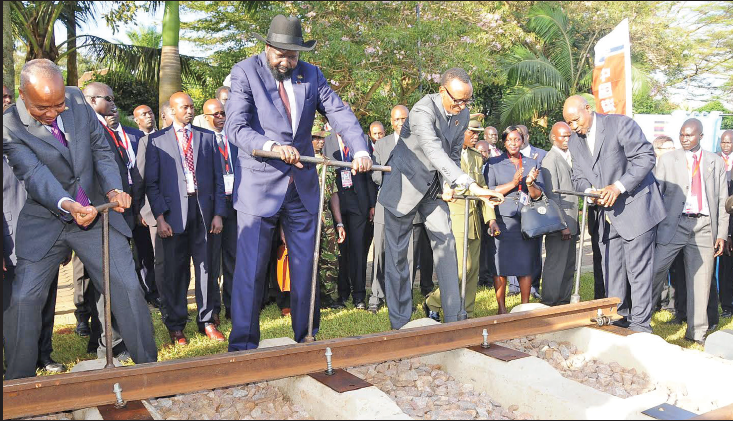Construction of the Standard Gauge Railway (SGR) is expected to commence before the end of this year.
The SGR is one of the projects that have been prioritised during the next financial national budget after being allocated sh2.2 trillion.
Canon Eng. Perez Wamburu, the SGR project coordinator, described the allocation, the bulk of which will be channelled towards the physical construction, as the ultimate signal that the project is set to commence.
“For long, we have always been allocated money for land acquisition of the mapped corridor where the railway will be developed. This allocation shows you the high ranking of the project on government priorities this time,” Wamburu said on Wednesday.
THE PROTOCOL
In 2014, Uganda, with her Northern Corridor Partner States of Kenya, Rwanda and South Sudan, signed a regional SGR protocol to develop a seamless transport system interconnecting their cities and the landlocked countries to the coast.
Uganda, in 2015, handed the contract for development of the 273-kilometre Malaba- Kampala leg, the first phase of the project, to Chinese majority state-owned firm China Harbour and Engineering Company Ltd (CHEC) at a cost of $2.2b (about sh8.3 trillion).
The contractor was under the contract obligated to help Uganda source for financing for the project, but the East African country was frustrated by the Chinese firm’s failure to do so.
At the end of 2022, the Ugandan government wrote to its Chinese counterpart terminating CHEC’s contract after eight years of nonperformance.
New Vision learnt that the Chinese hesitated to fund the project after casting doubt on Kenya’s commitment to extend the line to Malaba border, something that would leave Uganda’s line `hanging’ and unviable.
NEW CONTRACTOR
Uganda instead engaged with Yapi Merkezi, a Turkish firm, as the proposed contractor for the Kampala-Malaba leg. Since then, the Turkish firm has been engaged in closed door negotiations with the Ugandan government and Wamburu says the talks are at the tail end.
“My expectation is that we shall close these negotiations with the proposed contractor before the end of this month. We shall agree on the terms of engagement including the pricing costs. Once the agreement is in place, we shall be ready to stand the physical works within a period of three to six months,” Wamburu said.
Once the physical constructions commence, the first phase is expected to be completed within a maximum period of 42 months.
LAND COMPENSATION
Currently, the project secretariat is undertaking land evaluation, revaluation and compensation of the project affected persons along the corridor.
Wamburu explained that they have so far acquired at least 50% of the corridor from Malaba to Jinja and compensated at least 90% of the corridor from Malaba to Mayuge, and what’s left is to proceed past the Nile.
“Once we acquire land past the River Nile, we shall have enough corridor for the contractor to begin work for quite some time as we continue the acquisition on the remaining corridor,” he explained.
On the advice of the chief government valuer, The Secretariat has been undertaking revaluing some of the land that was valued years ago but never been compensated.
This is intended to cater for land and property price changes that have taken place since 2016 when the initial evaluation was undertaken.
The project is registering variances from the initial assessment as new and higher values are arrived at from the reassessment.
REGIONAL COMMITMENT
Last month, the Northern Corridor Integration Projects (NCIP) partner states, comprising Kenya, Uganda, Rwanda, and the DRC, agreed to jointly mobilise funds to fast-track the development of the project.
During a ioint ministerial committee meeting on SGR, held in Mombasa in Kenya last month. Kenya committed to extending its SGR to Malaba, something that would make Uganda’s project viable as initially intended.
East Africa’s biggest economy is expected to resume the construction of its Naivasha- Kisumu-Malaba and Kisumu- Malaba SGR sections starting July and September, this year, respectively.
“We are committed to fasttracking the development of the SGR project to enhance regional transport integration and promote economic growth. This project will have a transformative impact on our region’s economic development, and we are committed to ensuring its successful implementation,” Kipchumba Murkomen, Kenya’s cabinet secretary of roads and transport, said in a statement.
Kenya’s Naivasha-Kisumu- Malaba line is estimated to cost $5.3b (sh2o trillion) and Murkomen says they are in talks with the private sector to see if they can structure an arrangement for them to take the large burden at reasonable terms.

